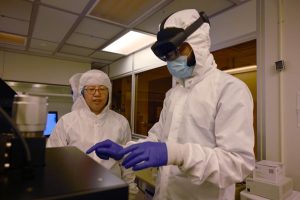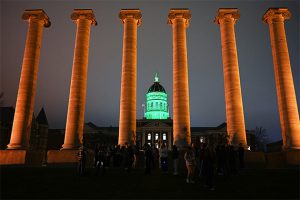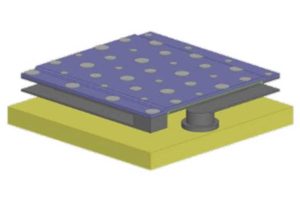
June 6, 2025
Mizzou Engineering leaders awarded named professorships
These three-year appointments recognize excellence in research, teaching and service across multiple disciplines.

Nov. 15, 2024
Mastering semiconductor fabrication through extended reality
Mizzou Engineers recently received a grant to enhance semiconductor fabrication education using artificial intelligence and extended reality.

March 18, 2024
Faculty, staff, students, alumni recognized with Engineering Awards
Mizzou Engineering on Friday recognized outstanding faculty, staff and students for their dedication and service as part of the College’s annual awards banquet.

Feb. 6, 2024
$5 million NSF grant supports innovative approach to prevent foodborne illnesses
Like a silent saboteur, foodborne pathogens can sneak up and ruin your next meal. One of the biggest culprits is salmonella, a type of bacteria found in many foods that causes more than 1.3 million cases of foodborne illnesses annually according to the Centers for Disease Control and Prevention. Despite nationwide efforts, salmonella’s infection rates have remained nearly unchanged for the past 30 years. Now, MU is part of an interdisciplinary effort determined to change that after recently receiving a three-year, $5 million grant from the National Science Foundation’s Convergence Accelerator program.

Jan. 13, 2023
Mizzou Engineer leading NSF Convergence Accelerator project to ensure food safety
A Mizzou Engineer is leading a team to develop new technologies that will quickly detect foodborne pathogens with the goal of improving food safety, especially among lower socioeconomic communities.

Jan. 11, 2023
Team using artificial intelligence to revolutionize infrared sensors
With funding from the U.S. Army, a Mizzou Engineering team and collaborators are using artificial intelligence in hopes of revolutionizing infrared sensors.

July 12, 2022
Almasri awarded patents for harvesting energy; improving imaging; producing sensors
Mahmoud Almasri was awarded patents for harvesting energy, improving camera imaging and producing sensors.

May 10, 2022
Engineering faculty recognized for patents that take research to market
When Mizzou Engineering’s top faculty aren’t teaching the next generation of engineers, they’re busy collaborating with medical, plant science and other researchers across campus to make life better for the rest of us.